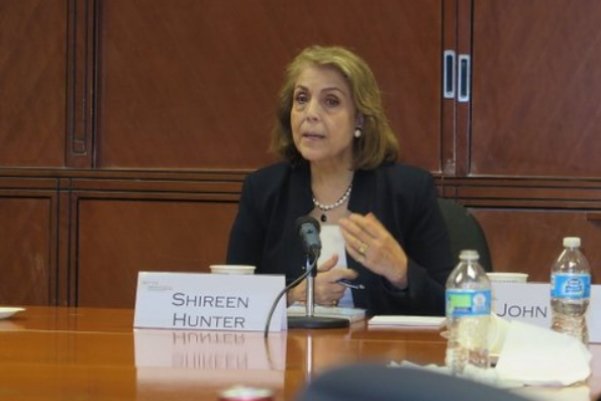Trump partly right about unfair trade practices: Hunter

TEHRAN - Shireen Tahmaasb Hunter, a professor of political science at Georgetown University, tells the Tehran Times that that “Trump is partly right about the unfair trade practices of some of America's trading partners such China and Europe. Some of the trade agreements, such as NAFTA, signed during the Clinton administration were not fair to America.”
Professor Hunter also says that “Tariffs are not the only barriers to fair trade. Non-Tariff barriers, including government subsidies and excessively low wages, are also kind of barriers to fair Trade.”
“China and Europe use this type of measures to undermine American exports to their markets. Trump wants to correct this imbalance. However, it is not clear whether he will succeed,” Hunter tells the Tehran Times.
Following is the text the interview:
Q: Is "Trumpism" a flow, school, and thought in the United States? Can the current president of the United States produce a political or philosophical thought in the field of American social and foreign policy?
A: Trumpism is not a particular school of thought such as liberalism, socialism or Communism. Trumpism reflects the frustration of a certain portion of the American public, especially the poor whites, that feel that their interests and needs are not taken into account. They complain that other groups such as the African-Americans and the Hispanic have special lobbying groups and sometimes receive special treatment. These whites feel that the very large number of immigrants has changed the demographic balance against them as well as altering the country's cultural landscape. Many of them are socially conservative and do not approve of certain liberal policies such as same-sex marriage. They feel that other countries, such as China as well as the European and Middle Eastern states have taken advantage of America. Therefore, they feel that America should look after its own interests and as Trump has said “put America first".
Q: Trump has repeatedly stated that he is not a Republican. In your opinion, what is the current political affiliation of Trump Itself?
A: Trump is not the classic Republican. However, his positions on many issues, including immigration, fiscal policy and foreign policy, are closer to those of the Republicans.
Q: The president of the United States has used his own cabinet of neoconservatives, such as John Bolton. This is while he previously described himself as George W. Bush's sharp opponents. How do you evaluate this contradiction?
A: Trump is closer to the right wing of the Republican Party. On some aspects of foreign policy, such as that regarding Iran, he is close to the neo-conservatives. However, Trump himself is not comfortable with the excessive use of military power as are the neo-conservatives. Rather he is pushed by some allies such as Israel and Saudi Arabia to adopt a more interventionist posture in the Middle East.
Q: If we think of Trump as a Republican, what is his idea of which spectrum is closer to this party? (T-party, Neoconservatives or Traditional Republicans)
A: Although he does not share all the ideas of the Republicans, Trump is connected to the Republican Party. He ran on the Republican ticket and supports Republican candidates for Congress.
Q: Is Trump's protective approach to the economy or his special emphasis on "American values" can be a sign of his influence on a particular economic and political school (thought)?
A: Trump is partly right about the unfair trade practices of some of America's trading partners such China and Europe. Some of the trade agreements, such as NAFTA, signed during the Clinton administration were not fair to America. Tariffs are not the only barriers to fair trade. Non-Tariff barriers, including government subsidies and excessively low wages, are also kind of barriers to fair Trade. China and Europe use this type of measures to undermine American exports to their markets. Trump wants to correct this imbalance. However, it is not clear whether he will succeed.
Q: Is the election of Trump as the president of the United States in 2016, a symbol of American citizenship tendency towards populism? Otherwise, how can such a phenomenon be interpreted
A: To some degree, all politicians are populist in the sense that they appeal to peoples' needs and prejudices. Certainly, Trump did manipulate the frustrations of a group of American voters and used slogans that appealed to them. But so do other politicians. Democrats used another set of slogans appealing to another demographics. Certain groups and countries are worried about a policy of America first, because this would mean that they should accept more responsibility or that American markets would not be wide open. Therefore, they call these policies populist in order to discredit them.
Leave a Comment